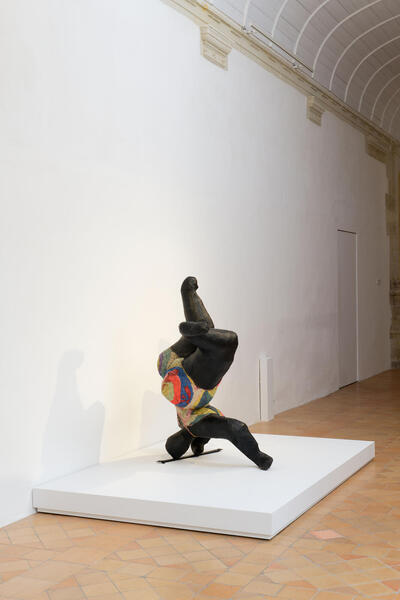Nana noire
Paint, wool and fabric on wire mesh
52 3/4 × 42 1/8 × 29 1/2 in
Resistance to the subjugation of women in Niki de Saint Phalle’s work merges with the struggle of African-American minorities, victims of the violence that is part and parcel of American society. Nana Noire (1965) is one of the first black Nanas executed by de Saint Phalle following Black Rosy (or Mon coeur appartient à Rosy, 1965), which is also made of fabric and wool, and mounted on a wire mesh. Like Black Rosy, Nana Noire is clearly an allusion to Rosa Parks, an iconic figure in the fight against racism in the United States (even if this is not reflected in the work’s more generic title). Nana Noire interweaves the struggles against racism and sexism, claiming its place in space through its fulsome — even monumental — shapes, its acrobatic, upsidedown position, and the cheerful colours of its clothes. The historic demonstration led by Martin Luther King in Alabama In 1965, together with the adoption of the Voting Right Act in August, guaranteed the right to vote of all US citizens. The emergence in the following year of the Black Power movement inspired de Saint Phalle to choose the title Les Nanas au pouvoir for her exhibition in Amsterdam’s Stedelijk Museum.
This work was first presented by the Pinault Collection in the exhibition « Forever Sixties » at the Couvent des Jacobins in Rennes (2023).

© Couvent des Jacobins, photography Aurélien Mole
Vue d’exposition : « Forever Sixties » présentée au Couvent des Jacobins, Rennes, 10 juin – 10 septembre 2023
Courtesy Pinault Collection
Niki de Saint Phalle
Nana noire, 1965
